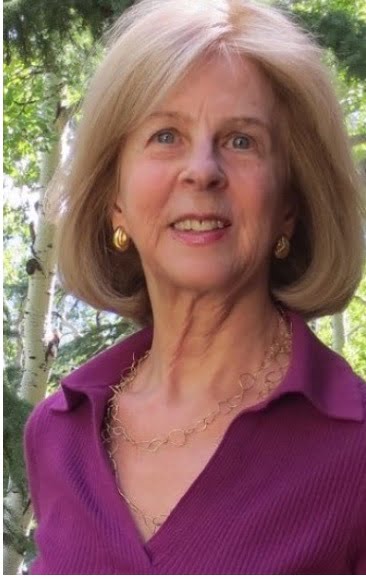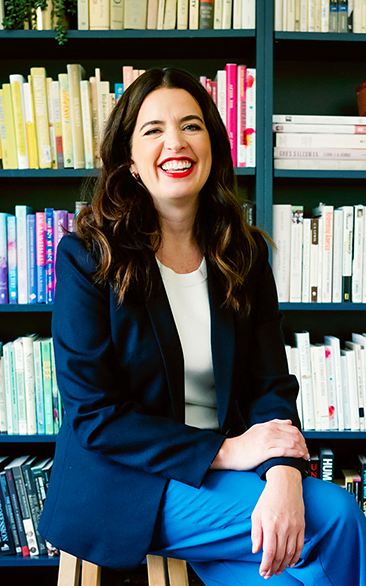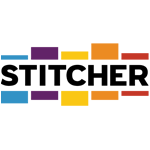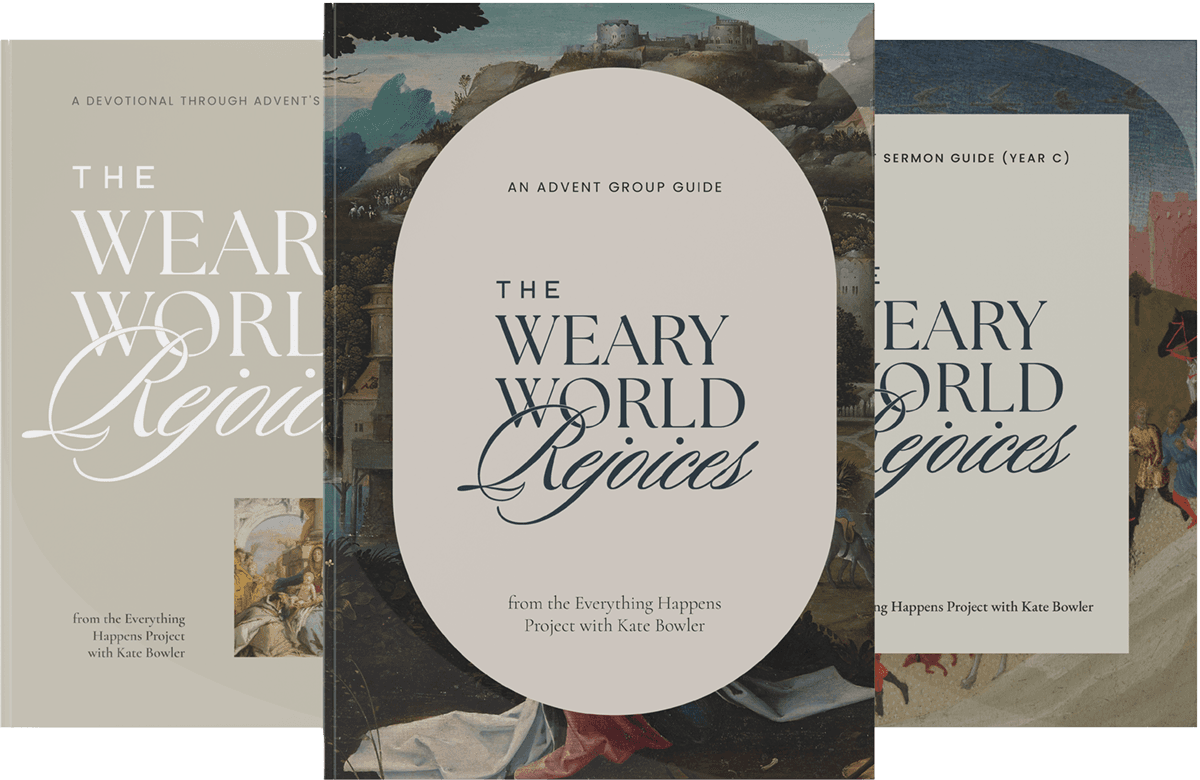Kate Bowler: Don’t you wish there was some kind of cap on suffering? Like there was someone keeping track and could say, Yep, she’s gone through enough or no more for him. He’s maxed out. Only good things for them from here on out. And of course, as much as we want that to be true, we know, you and me, that somehow everything keeps happening, no matter how much good we do or how generous we are, or how much faith we have, or how much we manifest happiness. My gosh, the amount of manifesting people are trying to do right now, it’s really keeping me in business friends. It’s really keeping my intellectual interests alive. But there really is no formula that will exempt us from the realities of being a person. My name is Kate Bowler and this is the Everything Happens podcast. This reality of no easy to understand formulas can be so hard to live in, especially when we’ve simply lost too much, or when the pain is too much to bear, when the sky keeps falling. When we just can’t catch a break. When miracles seem to happen to other people, but not us. I wanted to talk to someone who has had her own experience of shaking her fist at the sky wondering, Haven’t I gone through enough? I feel so lucky to be speaking with my friend Elaine, thirty years after back-to-back tragedies had left her life undone. So what does she think about mystery and hope and love now? Let’s find out. I am here with the absolutely extraordinary Professor Elaine Pagels. She is best known for her research and publication on ancient Greek texts, their mysteries and their beauties. She received her doctorate from Harvard. She is a no big deal, MacArthur genius. She has been on faculty at Princeton and made it her intellectual home for such a long time. But for my special purposes, she is also the author of award-winning books like The Gnostic Gospels and her stunning memoir, Why Religion? Elaine, you are so special to me, and I feel really grateful that we’re doing this here today.
Elaine Pagels: Thank you so much, Kate.
Kate: I wondered if we could start at the beginning then. Could we talk a bit about your childhood? What were your parents like and what did maybe faith look like in your family of origin?
Elaine: Faith didn’t look like much. The family was culturally Protestant, and my mother took my brother and me to a little Methodist church, which was sort of boring and pleasant. And my father had no use for it because he had been brought up in a kind of Presbyterianism I can only call ferocious. He said his family argued intensely about religion all the time, and he hated the arguments. He hated being dangled over the fires of hell all the time because you’re a terrible sinner. And as soon as he learned about science and Darwin, he just said, “Done with that, Who needs it? Those are silly old folk tales. The world wasn’t created in seven days. It took geological time. And now we have a much better way of understanding everything.” So he gave it all up for science. And so many people did, you know, it was the Darwinian destruction of the Bible. Right? And he bought into that completely. And I understand he had good reasons for it. I mean, you know, he that so many people have very good reasons for ditching the religion they were brought up with. And I thought he made a very good decision. But. I also got so interested in poetry and music and dance and what I didn’t know is how the poems we have, some of the most loved most, the music we loved of Bach and Mozart and so many others like spirituals comes out of these religious traditions … the poetry, the music, the dance, all of it. It was only when I was about 14 or 15 that I went to a Billy Graham crusade. Kind of by accident.
Kate: Yeah.
Elaine: Unexpected. I didn’t know who this was, but people I knew were going. So I went. And I was really overwhelmed with the emotional power of that preacher when he was starting. He was very compelling. He was very powerful, and he evoked a world of cosmic reality and then invited everyone to be born again. And I thought, wow. You know, I was 14, you can have a new life. You can have start all over again. I loved it. So I just jumped right in and went down and was saved, you know? And my parents were horrified.
Kate: Oh, your parents, these wonderful rationalists. Seeing a woman, seeing a teenager/child/almost-adult, just so stirred.
Elaine: It was sort of like what happened when I was reading The Wizard of Oz when I was eight or something, because it opened up a template. On which you could imagine your life unfold. You know, there’s Dorothy going out to a strange country and conquering her fears with her little dog and the wicked witch and finally, you know, getting back home. It’s a great story. And the story of Jesus and satan opened up. I felt like the world was opened up to me. And it was. Partly the opening of the imagination that religious traditions do at their best and sometimes at their worst, depending what what they evoke.
Kate: You’re so good at. And it’s such a generous way that you do this where everywhere it seems like you get the hunger feeling that people have, that they, we ache when we hear a certain story, I mean, about God or being connected with a deepest humanity. Like, what kind of hunger is it that drives us to have these rich spiritual questions?
Elaine: Well, I think it’s our limited capacities and our small lives and the vulnerability of it all and recognizing at some level, I think, that we’re part of something much greater. How do we articulate that? How do we engage that? The traditions have always been a way of connecting this little tiny self down here with everything else.
Kate: I read so much of your scholarly work before I knew about your beautiful epic life, honestly. And there’s so much of it that is defined by your loves. I mean, intellectually, emotionally, it’s you. When you fell in love with a wonderful physicist. Seems like it expanded and changed your mind and your family. I wondered if you would tell me about that story.
Elaine: It was absolutely wonderful. I mean, I didn’t know there was someone like that who was such a good dancer and such a playful and open-hearted person who wanted to know about everything in the world and try every kind of food and travel everywhere. And, you know, and I was kind of introverted and shy. I was brought up to be kind of fearful of the world. And here he was just sort of pulling me into it like a like a bull. And I felt like I was holding onto the tail and getting dragged into things like I didn’t expect. It was a wonderful thing. And the 22 years we had together were transforming, you know, in ways that I so much appreciate. I mean, a really good relationship. As you know, you you do become interwoven with each other. Yes. Some people would say, oh, you know, science and religion, you must you must have amazing conversations. He would laugh and say, it’s all lust.
Kate: That’s such a funny thing to say.
Elaine: So he was very playful and honest and very open. I mean, he said, “religion?” I wrote that. “Why religion? I mean, why would anybody do that?” And you know, and I said, “So why elementary particles? What is that all about?”
Kate: Oh.
Elaine: And, you know, as I wrote, I mean, we were both trying to understand something fundamental. And for him, the way you understand your connection with the universe, he was sort of fascinated by Einstein. Is you just try to embrace it all, the cosmology. How does it work? Look into the Milky Way and the galaxies way beyond that. You know, that wasn’t my way. But I thought, I love the imagination of these physicists.
Kate: One of the things that this community really has in common is that we all can remember the time when we first realized that our world has come undone. And you know that so deeply and intimately. I wondered if you would mind telling me about your son and what that love looked like.
Elaine: Yes. When we got married, we were exploring the world, traveling to Africa and Egypt and wherever, and he was doing science. And I was really fascinated with the secret gospels, and we assumed and hoped we’d have children. It didn’t happen. And so we went to all kinds of doctors and all that stuff. And with a lot of effort and help from fertility doctors, we finally had a child that we adored. And we were ecstatic. He was amazing. Not long after that, we were told he had a serious problem with his heart that would require surgery. He was then about a month old. And they were going to operate when he was one. They were going to wait until a baby was big enough to withstand surgery. Now they also operate much earlier. So we were living with that uncertainty and it was terrifying. The open heart surgery on a tiny child. I mean, yeah, it terrified us. I mean Heinz wasn’t as terrified. He just wasn’t as susceptible to that. And so, you know, we went into that and the heart surgery went very well and it was wonderful. And then a year later, we were told that he had a lung disease that was invariably fatal.
Kate: Oh.
Elaine: Utterly, utterly shocked. The doctors couldn’t believe it. None of us could that was having everything undone?
Kate: Yes.
Elaine: Living with a child that we adored. And thinking what I said. “How? What are you talking about?” They said, “Couple of months to a few years maybe.”
Kate: Oh, love.
Elaine: At that point, he was two. So we lived with that. Yeah. So we encounter, you know, the loss of that child and that was what we thought is the worst thing that could happen.
Kate: Yes. When people describe anticipatory grief, is that what it is, Elaine, where you have to live in two timelines?
Elaine: Yes.
Kate: You said something like it doesn’t start with a death. It starts with a diagnosis.
Elaine: Well, when the diagnosis happened, the doctors at Columbia Presbyterian said, Well, why don’t you go and talk to this nurse? And I thought, Oh, I know who she is. Oh, she’s the one who talks to parents with dying children. And I’m not a parent with dying children. My son is in kindergarten and he’s building an airplane there today. He’s not dying. Yeah. So I refused to go see her and only when he was five and I had stubbornly refused. It’s not that I didn’t believe it. It’s just that I just kept shoving it aside. But I could see he was getting thinner. He couldn’t eat very well. We had to postpone his birthday party. But still, he looked quite normal. And he was living the life of a an active five-year-old. But I went to see this nurse. Because I had gone to see a psychiatrist who said I was depressed. But he said, “It’s not that you’re a depressed person. It’s situational depression.” And she said, “Well, yes, there’s a name for what you’re going through. It’s called mourning.” She said, “It doesn’t start when somebody dies,” as you quoted. “It starts when you hear a diagnosis like that or it can. So connect with that too the love and with the terror.”
Kate: I used to call Zach my impossible thought because the idea that I would not be his Mom just felt… so when you said, “I didn’t want to do that. I didn’t want to have that conversation.” I think. Absolutely. You are my impossible thought.
Elaine: But you were also dealing with your own mortality. That’s another level, too, Kate. We try. I celebrate your energy and passion dealing with all of this.
Kate: You you love so deeply. And the way that you talk about loving your beautiful son. And then the experience of that grief and then choosing to adopt, it reminded me of … Jayson Greene wrote a beautiful book called…I’m going to get it wrong, but it was like but Still There Were Stars, something like that. And it was. He’d lost his child very tragically and then chose to have another one. And I said, “Jayson, was that a hard choice?” And he said, “It wasn’t a hard choice. It was a soft one.” That they could, that they found that their love kind of like pressed a way forward and that reminded me of you.
Elaine: Yeah, well, we had hoped to have more children biologically, but that didn’t happen. And I knew that I could not imagine survivinghaving a child and a child die. I don’t use the term “lost” because that reminds me of people who lose their keys or something out of carelessness, and it suggests carelessness or neglect.
Kate: Good for you. I like that. That frankness is a gift.
Elaine: Yeah. I keep thinking when people say, “You lost your child.” I didn’t lose him at the supermarket. I didn’t just leave him there and forget. He died. You know, that’s different. But anyway, I knew that I couldn’t imagine surviving if we didn’t have somewhere to go with the love we had for this child. So we went to an adoption agency and adopted a child who needed parents as much as we needed a child. And that was helpful.
Kate: I like that you describe love like it needs to go somewhere. Like thats a. Like water it’s just going break into a new tributary.
Elaine: What do you do with it? Yeah. If the person’s not there.
Kate: Yes. Where’s all this going to go?
Elaine: And it is like water in the sense that that can flow toward other people. I think that’s why when we do experience bereavement, we instinctively hold on to each other.
Kate: Yes, unless we’ve accidentally convinced ourselves that. Because it was impossible. And because it is devastating and because it makes us feel lonelier than we’ve ever been that we are that we are, in fact, alone. I mean, you’ve had long seasons of loneliness. It sounds like you understand how how hard it is to reach out and recreate community, especially when you’re the first one. Elaine, were you the first one among your friends to have experienced the death of a child?
Elaine: I didn’t know anybody who had unless perhaps the child was stillborn. That is a different kind of experience. It’s not one that I knew about from firsthand, but somebody who’s lived with a child they love and raised a child and then the child is gone. I didn’t know anyone who’d been through that. You know, Kate, the worst thing about it, when a child dies, is that you (and you know as a parent), you feel like you failed no matter what you did. But there are many cases in which a child has an illness that can’t be repaired and the parents do absolutely everything imaginable. And nevertheless, there’s nothing they can do to change the situation. Nevertheless, they feel guilty. And so I was looking at the study and the history of religion. I thought, why do we pile guilt on top of that? I mean, a Buddhist might say, “That is the child’s karma. The child came into the world with that energy and departed with that and completed what that person needed to do here. And goes on to other lives.” Okay. But I looked at the Bible. There it is in Genesis. Why do people die? Somebody sinned, that’s why. And if they hadn’t sinned, that wouldn’t have happened. But if you sin, you’re going to die. So dying feels like punishment. This is not true in every tradition at all. But it’s part of biblical tradition. And I sure got it. And it’s that guilt that is compounding the grief in such situations. Not only that, but in many situations of bereavement, one feels guilt. If you’re not guilty, why do we still feel guilt on top of the grief? So I wanted to write about that, Kate, because I thought, it’s bad enough to deal with that kind of loss. But you don’t have to pile grief and guilt on top of it.
Kate: Yes. Yes.
Elaine: As our tradition has done to us.
Kate: And, you know, the insipid nature of our American prosperity gospels. I always think that’s the great American magic trick, the way they transform tragedy into failure.
Elaine: That’s well said.
Kate: I remember reading an article about what happens to marriages after a catastrophic a loss, a death. And so often that blame shifts internally and people can’t be as open and empathetic. But it sounds like you and your husband grew closer and you found a way.
Elaine: Yes, it’s true that many marriages end at that point because someone blames someone else. And I think that’s easier, it’s maybe more likely to happen if there are some accidents that could involve one parent more than the other. You know, there’s many circumstances. But the idea of that, I talked to one friend of mine whose two-year-old son died and he said he started having affairs and only then did he realize, he said, that he couldn’t look in his wife’s eyes because there was so much sadness. And when he realized that, they re-connected, but he was avoiding her. Because she understood as well as he did. And with another woman, he could just kind of forget it for a while, you know? But now they have more children. And that is some consolation. It doesn’t erase grief, of course, but it softens it.
Kate: The way that your understanding of suffering made you want to look at the substratum of the universe like it pushed you closer and closer to mystery, didn’t it?
Elaine: Yes, and also, it pushed me closer and closer to the way we’re enculturated for one thing, and to the assumptions we make, you know, that we’re somehow invulnerable, right? I’m sure we’ve all had that you grew up with, that you kind of have that quality of free spirit.
Kate: Tigger-ness. A little Tigger. Yeah.
Elaine: It’s there.
Kate: Yeah.
Elaine: Even though it’s not a naive one.
Kate: Oh.
Elaine: But we. We adopted a child, and after. A year after Mark died, I dared to ask my husband if we could adopt another child. And we did. And that was a really wonderful occasion. But then you see, you know how it is. You feel like if something very challenging happens, you think I have paid my dues, right? That’s all that can happen. Nothing else. That’s it.
Kate: That’s it. I did it. I got through.
Elaine: Something happens to everybody, right? As my husband used to say, “Everyone has something like this in their life.” And I was like, “Wait a minute. Not the death of a child.” And he said, “No, not this, but something.” And he was right, of course. I resented him saying it.
Kate: Yes, absolutely.
Elaine: But nevertheless, I felt we paid our dues. And then that’s when, you know, a year later, suddenly he had a mountain climbing accident and suddenly was dead. And right after he’d been vividly alive a minute before. It was just then, I thought, Now I’m done. You know. Totally devastated.
Kate: I imagine you were done just for like, okay. All right, that’s it. Yeah. Thanks. That’s it.
Elaine: Well, if I didn’t have two children, I just. Yeah, I felt like just driving off a cliff.
Kate: Yeah.
Elaine: And almost did that. Not intentionally. I wasn’t trying to kill myself. I just didn’t want to feel that pain.
Kate: Yeah. The desire to just scream, though, at whatever is supposed to be in charge in that moment, the like. Now, I’d like to I’d like to call it now. I would like there to have been a boundary that I create around what is done. And I have I have suffered more than I can possibly imagine.
Elaine: Yes. Yes.
Kate: I’d like. I’d like to call that now. Thank you.
Elaine: Well, I think I wrote about going up to the monastery where I often found consolation with the monks and one of the monks who was a visitor from another monastery, not a friend, said, “God must love you very much.” And I looked at him and I said, “That reminds me of what say St. Theresa said, ‘If this is the way he treats his friends, then no wonder he has so few of them.'”
Kate: If I could replicate you by mitosis and put you everywhere … your ability to break down an absolutely horrifying and burdensome cliche is so, so good. It’s so good for my soul. Like, you know, when you said don’t say “lost.” I didn’t lose him. When someone told you that everything happens for a reason right after.
Elaine: Yes. The policeman who came to tell me that my husband had just had just shattered into a thousand pieces on a mountain. And I had two babies. Yeah, a three month old baby and a year-and-a-half-year old. And he said that I. I could not speak, Kate. And I never thought I would write about it, but I did. I was standing next to a door. On the deck of the house and I just ripped the door off the hinges. Now, how? How did I do that?
Kate: Did you really? Yeah. It’s like when people lift a car.
Elaine: I ripped a door off the hinges.
Kate: That was you.
Elaine: I was so angry. Yeah, that he said that. And I couldn’t speak and I couldn’t sock him in the face. And I couldn’t say a word. I just.
Kate: Yes. What choice do I have but to survive this? What choice do I have but to love these kids? What choice do I have? And you have a huge job. I’m just gonna say. The way you broke into the study of religion as one of the incredibly few women battling misogyny at all times, frankly. I mean, had a New York Times bestseller about ancient texts, which, as you know, is a well-worn path. You know, everybody.
Elaine: I know, this surprised everybody.
Kate: Did having so much work become a place like love where the energy could go or was it, at that point, just about survival and parenting?
Elaine: It was so much deeper than the work. I just felt like my body had split, so I didn’t even think about my career at that point. I just felt, oh, shattered. The only word I could think of was shattered. His body was literally shattered, and I felt that our whole life pattern was shattered to everything where we lived, how much money we had. No far less than half because we both worked previously. How to proceed? I had no clue. I had no clue. I’m just surprised that, I’m surprised that people live through this stuff. And we do. You know, I mean, the resilience is amazing.
Kate: Yes.
Elaine: You know, I think it surprises everyone. I mean, you’ve lived through a great deal and beautifully. And other people do. Isn’t that amazing?
Kate: It is. I guess that is a feeling I have, though, when I look at you, though, is I feel amazed because. You haven’t just survived. You keep having big, beautiful new chapters. If we were just to pretend it is, then, a book with many more at the end of this memoir. What do some of these new chapters look like now? Because I have a sense and I love all of them.
Elaine: Well, it was it was quite a bit of time after my husband’s death that I kind of reconstructed a life and wrote a book about the devil because it seemed very appropriate, because, you know, I thought somebody said, “Don’t blame God.” And I thought, “How stupid, I don’t blame God. That’s not what this is about, that’s not how I understand it. But I’d love to blame somebody. How about the devil?” I mean, that’s what in the ancient world they say is the devil who throws obstacles at you. So I thought, I’ll be mad at the devil. I’ll take out my, I’ll play out my anger that way. But after that, I don’t know. I’m raising two children. And you’re, you know, I always thought I’d rather have my life too full than to empty. And it was too full. I had both of them. I had to move out of New York to a place I could afford. I was at Princeton. I had to move here, which isn’t a suffering, but it was leaving all my friends and all of that. Selling my house and changing life. And then I did have the work. I mean, after a couple of years and writing the book about Satan was also a form of therapeutic process. You know, creative work can be very helpful at that point, as you know. And so I sort of poured myself into that, the work that I love and the people that I engage that way and many other friends and reconstituted life. But I think you’re talking about what just happened about two months ago.
Kate: Oh, no, I don’t know! Tell me.
Elaine: Yes, you do. Well, it’s so surprising, I wrote this book, Why Religion: A Personal Story and I wrote about things that happened when I was 16. One of the people I mentioned in the early part of the book heard that I’d been talking about his name on the air and he wrote me a letter and came to visit. And that was about three years ago. We got married about two months ago.
Kate: Oh, I didn’t know that! That makes me so happy!
Elaine: I thought you knew!
Kate: I know I met you when you were like, “He was coming for a weekend” and he seemed so cool. And I was like, “Oh my gosh, Elaine has a life and it’s amazing.”
Elaine: Yes, Well, I did have a life. And I mean, this is somebody who I knew from a little group of maverick people I knew and musicians and artists, and it would be everybody. And and one of them founded the group the Grateful Dead. And he was also very close friend, Jerry Garcia. He was in our group. And that was when I was in high school. He was older than us, but then we were but there it was. And after I left and his other friend who became his buddy coming from London, coming from an upper class London life. He became one of Gerry’s best friends, and Gerry was a sort of street kid from Oakland, Hispanic, went into the army, got discharged, never went to college, did art, did music. And after some of the events I described, he got very serious about his music. And about four years after I left California to go to graduate school, he started a group called the Grateful Dead. And I thought, oh, that name comes from the automobile accident in which Jerry was involved, along with our friend, his friend Allen. And they both survived. And one of our friends didn’t. So I thought, oh, it’s about the accident. The name of the Grateful Dead. And somebody heard me talking on Terry GROSS and called up Allen and said, “Hey, somebody on the radio was talking about how the group got his name, but she doesn’t know the story.” And he said, “Actually, you don’t know the story.”
Kate: Oh.
Elaine: Because Jerry didn’t talk about that and neither did anybody else. And so this friend, Allen Trist, he had been invited when the Grateful Dead went to London to publish music with them. And he thought, “Shall I stay here in England and continue to negotiate between corporations and working people and try to advocate for labor? Or shall I run off with the rock and roll band?” He went off with the rock and roll band and retired from it about five years ago, publishing music, part of the staff.
Kate: Yeah.
Elaine: Part of one of the road managers, as he said, who kept everything going on the tours and were in the back dancing and breaking dance. So we just got married, isn’t that wild?
Kate: Oh my gosh, Elaine!
Elaine: I thought you had heard that. Yes, he’s quite wonderful. He loves to dance.
Kate: It’s just so funny because, you know, because we both met when we were doing, when we’re talking about all of our undoings. And it meant so much to me to see you standing there absolutely lit up. And I thought, Oh, I’m learning something. I’m learning something about how love pulls you forward. And I’ve thought about you a million times since.
Elaine: Well, it does.
Kate: Elaine, you are wise and kind, and I am so proud to be your friend. Thank you so much for doing this with me.
Elaine: Well, thank you. It’s really a gift, especially to surprise you with something I thought you might have knew.
Kate: I didn’t know. Oh, it makes me happy.
Kate: Elaine helps us debunk so many of the stories we’re given when tragedies happen. The religious stories that put blame on the wrong people, the guilt parents experience, the lies that try to tell us that there is no hope. The painful platitudes like everything happens for a reason. She writes: “What is clear is that meaning may not be something we find. We found no meaning in our son’s death or in the death of countless others. The most we could hope was that we might be able to create meaning.” I just love it. What can we make? My dears, as we know, not everything happens for a reason. Or at least if they do, they are not any reasons we can divine right now. But perhaps there is some beauty and some joy and some truth and hope and mystery that we can cling to, to help us make sense of life without easy formulas. And I normally end these episodes with blessings. But today I thought it would be nice to have you listen to a poem that came in from a listener. His name is Jed Myers, and it is for all of us who wonder how to live in the after of lives that haven’t worked out the way we hoped they would. Here he is.
Jed Myers Hi, Kate. My name is Jed. I wanted to call and share a short poem that I wrote that was birthed out of just many hours of listening to this podcast and it doesn’t have a title yet, but here it is anyway: To see things invisible. To last medicinally. To stand on the edge of dangerous moments, flinching in respect of the glory that resides there. To come undone and come back together again. To breathe deeply of grace and sunshine. To play in the ripples of delight. To weep for weeping is necessary. To risk and fail and risk once more. To keep pace with the pine, in cadence with the chicory. To wander in mundanity and get caught up in the mystery of it all. As the world ends and the world begins again. This is how I want to be. To live. As everything happens.
Kate: Oh, my word. Thank you, Jed. Bless you, my dears. Bless you, Jed. Bless you all. May this be a beautiful, terrible week. I’ll talk to you soon. Bye. This episode of the Everything Happens podcast was made possible because of our generous partners Lilly Endowment, The Duke Endowment, Duke Divinity School and Leadership Education. And of course, nothing is possible without the wisdom and expertise of my absolutely fabulous team: Jessica Richie. My Heart, I love you. Harriet Putman, Keith Weston, Gwen Heginbotham, Brenda Thompson, Hope Anderson, Jeb Burt and Katherine Smith. This really is my very favorite kind of group project. So if you want to know what else we’re up to, head over to katebowler.com/newsletter so you don’t miss a thing. I would really love to hear what you thought about this episode. Would you consider leaving a review on Apple Podcasts or Spotify? It means a ton to us when we hear what you liked or who you want to hear in conversation next. Also, we really love hearing your voice. Feel free to leave us a voicemail. We might even use it on the air. So call us at 919-322-8731. All right, lovelies. I’ll talk to you next week. But in the meantime, come find me online @katecbowler. This is Everything Happens with me, Kate Bowler.













Leave a Reply